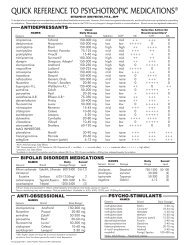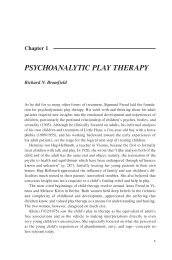IRAQ WAR CLINICIAN GUIDE
Iraq War Clinician's Guide - Network Of Care
Iraq War Clinician's Guide - Network Of Care
You also want an ePaper? Increase the reach of your titles
YUMPU automatically turns print PDFs into web optimized ePapers that Google loves.
Iraq War Clinician Guide 67 Military Sexual Trauma<br />
sexual trauma occurs within the workplace, this form of victimization disrupts the career goals of<br />
many of its victims. Perpetrators are frequently peers or supervisors responsible for making<br />
decisions about work-related evaluations and promotions. In addition, victims are often forced to<br />
choose between continuing military careers during which they are forced to have frequent contact<br />
with their perpetrators or sacrificing their career goals in order to protect themselves from future<br />
victimization.<br />
Most military groups are characterized by high unit cohesion, particularly during combat. While<br />
this level of solidarity typically reflects a positive aspect of military service, the dynamics of<br />
cohesion may play a role in the negative psychological effects associated with sexual harassment<br />
and assault that occurs. Because organizational cohesion is so highly valued within the military<br />
environment, divulging any negative information about a fellow soldier is considered taboo.<br />
Accordingly, many victims are reluctant to report sexual trauma and many victims say that there<br />
were no available methods for reporting their experiences to those in authority. Many indicate that<br />
if they did report the harassment they were not believed or encouraged to keep silent about the<br />
experience. They may have had their reports ignored, or even worse, have been themselves<br />
blamed for the experience. Having this type of invalidating experience following a sexual trauma<br />
is likely to have a significant negative impact on the victim's post-trauma adjustment.<br />
What Type of Psychological Responses are Associated with Military Sexual Victimization?<br />
Given the range of sexual victimization experiences that veterans report (ranging from<br />
inappropriate sexual jokes or flirtation, to pressure for sexual favors, to completed forcible rape)<br />
there are a wide range of emotional reactions reported by veterans in response to these events.<br />
Even in the aftermath of severe forms of victimization, there is no one way that victims will<br />
respond. Instead, the intensity, duration, and trajectory of psychological responses will all vary<br />
based on factors like the veterans' previous trauma history, their appraisal of the traumatic event,<br />
and the quality of their support systems following the trauma. In addition, the victim's gender may<br />
play a role in the intensity of the post-trauma reactions. While the types of psychological reactions<br />
experienced by men and women are often similar, the experience of sexual victimization may be<br />
even more stigmatizing for men than it is for women because these victimization experiences fall<br />
so far outside of the proscribed male gender role. Accordingly, men may experience more severe<br />
symptomatology than women, may be more likely to feel shame about their victimization, and<br />
may be less likely to seek professional help.<br />
Among both men and women in the active duty military, sexual harassment is associated with<br />
poorer psychological well-being, more physical problems and lower satisfaction with health and<br />
work. Female veterans who use VA healthcare and report a history of sexual trauma while in the<br />
military also report a range of negative outcomes, including poorer psychological and physical<br />
health, more readjustment problems following discharge (i.e., difficulties finding work, alcohol<br />
and drug problems), and a greater incidence of not working due to mental health problems.<br />
Studies of sexual assault among civilian populations identify posttraumatic stress disorder (PTSD)<br />
as a frequent outcome. Sexual assault victimization is associated with high lifetime rates of PTSD<br />
in both men (65%) and women (45.9%). Interestingly, these rates are higher than the rate reported<br />
by men following combat exposure (38.8%). Major depressive disorder (MDD) is another common<br />
reaction following sexual assault, with research suggesting that almost a third of sexual assault<br />
victims have at least one period of MDD during their lives. Victims of sexual assault may also<br />
report increased substance use, perhaps as a means of managing other psychological symptoms.<br />
DEPARTMENT OF VETERANS AFFAIRS<br />
- ---<br />
NATIONAL CENTER FOR PTSD




